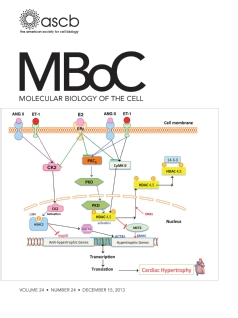
|
|
Molecular Biology of the Cell
Cardiac hypertrophy and progression to heart failure is the single most common cause of death of adults in Western nations. Important modifiers of this process are histone de-acetylases (HDACs), where Class I HDACs are pro-hypertrophic and Class II are anti-hypertrophic in regulating key gene expression. Despite years of testing HDAC inhibitors in humans to prevent cardiac disease, none of these agents have been FDA-approved because they selectively affect one HDAC class but not the other, producing a modest effect. Dr Ellis Levin, Professor and Vice-Chair for Academic Affairs and Chief, Endocrinology and Metabolism, recently published that estrogen acting at membrane estrogen receptor (ER) beta in the in-vivo heart and in cultured cardiomyocytes is the first described endogenous inhibitor of Class I HDAC production and action but also stimulates the synthesis and functions of Class II (anti-hypertrophic) HDACs. Using a novel and selective ER beta agonist, his laboratory finds strong protection against angiotensin-induced hypertension, cardiac hypertrophy and fibrosis, and progression to heart failure in mice. “By avoiding actions of estrogen at ERalpha that causes breast and uterine proliferation, Dr Levin suggests that ERbeta agonists might be used to prevent cardiac disease and treat hypertension in at risk women, warranting clinical trials. Download Full Article
